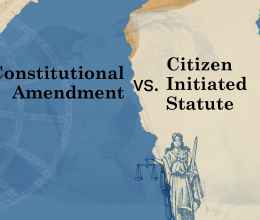Around the world, people are taking to the streets to call out the state-sanctioned violence against people of color that has been normalized and protected in this country since its inception. While police continue to respond to protests against police violence with police violence, other parts of our criminal legal system continue to steal the lives of people of color through different means. According to Bryan Stevenson, “we have a system of justice that treats you better if you’re rich and guilty than if you’re poor and innocent.” The system also tends to treat you better if you’re white and guilty, than if you’re Black and innocent. A recent opinion from the Supreme Court of Ohio, which Justice Michael Donnelly in his dissent called an “injustice” and a "failure” of our criminal legal system, demonstrates this sad truth by condemning another—demonstrably innocent—Black woman to die in prison.
Sheila McFarland was offered a plea deal to serve three years in prison for her role in the shooting death of Robert Williams. Maintaining her innocence, she rejected the plea. At her sentencing, the trial judge, Judge Daniel Gaul, made infamous by the podcast Serial and for the 8th District Court of Appeals finding that he acted with “bias and prejudice” in a snowball fight case, reprimanded her for not taking the plea deal and then sentenced her to life in prison without the possibility of parole.
It is undisputed that Ms. McFarland was not at the scene of the shooting. And yet, Ms. McFarland was convicted of multiple counts, including aggravated murder, on the theory that she aided and abetted the murder. However, the evidence connecting her to the crime is tangential at best, and directly disputed. Ryan Motley admitted to pulling the trigger, and in exchange for pleading guilty and agreeing to testify, he received a lesser sentence and will be eligible for parole after 18 years. Mr. Motley testified that Ms. McFarland did not help him get the murder weapon, did not talk to him about harming Mr. Williams, and that she played no role in the retaliation plan. Mr. Motley also had very good reasons to tell the truth—in addition to testifying under oath, the state initially reserved the right to rescind his plea deal if he was not truthful or made statements inconsistent with known facts. Yet he testified she wasn’t involved, his plea deal was not rescinded, and Ms. McFarland is now serving a life sentence.
What we have here is a case that highlights the problems with our criminal legal system.
Although Ms. McFarland was not present for and it was directly contradicted that she helped plan the murder, the prosecution charged her with ten counts, including aggravated murder. This practice, referred to as charge stacking, is a well-documented coercive tactic deployed by prosecutors. By charging defendants for crimes more serious than the underlying offense merits, prosecutors use fear of significant punishment to coerce defendants into agreeing to lesser punishments and charges via plea deals. For example, the same punch could be charged as simple assault or attempted murder. This charging decision is entirely up to the prosecutor. In many cases, the fear of being convicted for the most severe charge increases the likelihood of agreeing to a lesser charge, even if it’s still more serious than the offense merited.
Another coercive tactic that encourages plea bargains is cash bail. Cash bail creates a system of wealth-based detention that forces people without the resources to buy their freedom to consider pleading guilty to crimes they did not commit in order to regain their freedom. In some cases, pleading guilty could mean the defendant is released that day, while maintaining innocence could require staying in jail for days or even months before trial. While the Supreme Court of Ohio did not choose to include in its opinion information about how the evidence on which they were relying was directly contested, it did include information that Ms. McFarland allegedly sold drugs to raise money to bail her boyfriend out of jail before the murder took place, an act that speaks more to the unconstitutional system of wealth-based detention and the desperation it creates, than it does about Ms. McFarland’s participation in the events that followed.
Despite these practices, Ms. McFarland consistently maintained her innocence and put her trust in the system. Before trial and while the jury was deliberating, the prosecution offered Ms. McFarland a plea deal, usually an indication that the prosecution is not confident they made their case. Ms. McFarland exercised her constitutional right, and rejected the deals. At her sentencing, Judge Gaul mocked her and punished her for rejecting the offers. He even chided her for “playing the race card.”
The Supreme Court of Ohio had the opportunity to right this wrong, and instead, it bent over backwards to misconstrue evidence in order to affirm a life sentence without the possibility of parole.
Sheila McFarland is now another Black woman who will die behind bars. She is imprisoned at the Ohio Reformatory for Women, where prisoners are used for their labor and standardly earn as little as $18 per month in compensation. This facility is one of the prisons Governor DeWine ordered to make surgical masks for coronavirus patients.
Unfortunately, these stories are not rare. Stacking charges, coercive plea deals, wealth-based detention, biased judges, and prison labor—like police violence—are the norm in many jurisdictions across our country. Wrongful convictions occur all the time, and they result in people—disproportionately people of color—being taken away from their families. But instead of hiding behind qualified immunity and police union contracts, judges and justices shield themselves with false applications of due process, legalese, and a legal system that is more accessible and kind to the white and wealthy. Wrongful convictions make a mockery of our entire criminal legal system, unless we are willing to admit that the purpose of the system is to take away the freedom of innocent people of color. According to Justice Donnelly’s dissent, Ms. McFarland “chose to place her trust in the criminal justice system,” but it “failed her[.]” There is no justice in a system that treats you better if you’re white and guilty than innocent and Black. From policing through mass incarceration, our criminal legal system is failing our communities, and killing and imprisoning our neighbors. Silence is violence; we need to reform the entire system, or we, too, will fail Ms. McFarland and those who will certainly come after her.








